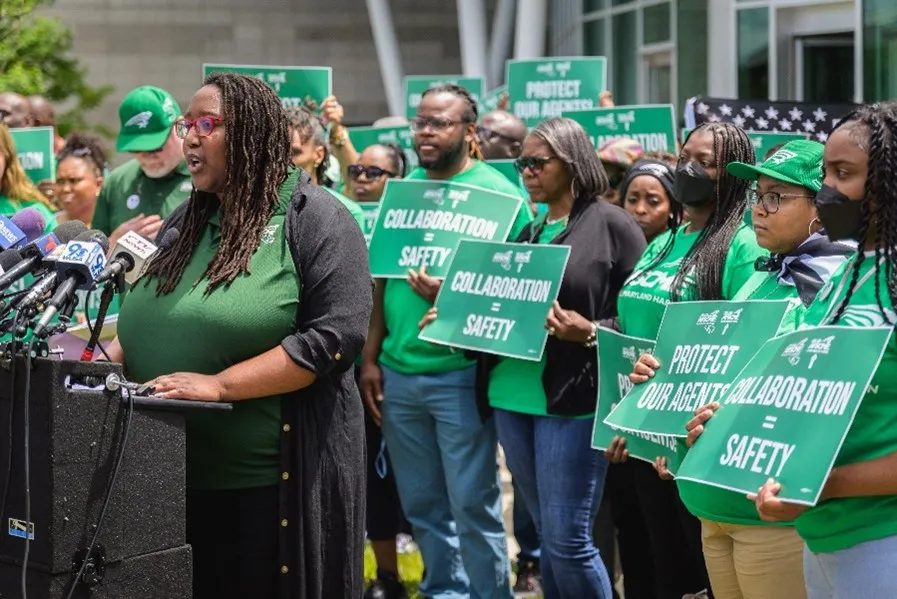Neglecting Safety: DPP Moves Forward with Flawed Field Work Policy Despite Union Concerns!

May 28, 2025 — In a deeply disappointing decision, the Division of Parole and Probation (DPP) has moved ahead with its Field Work Policy, despite strong objections and ongoing safety concerns raised by AFSCME Local 3661’s bargaining team. At the heart of the conflict is the agency’s failure to establish a comprehensive, effective safety plan for agents working in the field.
Union Bargained in Good Faith — DPP Fell Short
Over several bargaining sessions, Local 3661 negotiated in good faith to address shortcomings in multiple policies—Field Work, Employee Threat Notification, Staff Meetings, and Telework among them. While limited progress was made on certain items—such as updates to paired home visit protocols, panic button features, and tracking tools—the Division ultimately refused to address the core issue: real-time agent safety.
📵 A Phone Is Not a Safety Plan
DPP’s reliance on cell phone-based tracking apps and panic buttons is a textbook example of shortsighted planning. Under the current policy, agents are tracked via a mobile app, with supervisors expected to check in “no less than every 30 minutes.” But what happens in the 29 minutes between check-ins? What happens in areas with no reliable cell service?
These questions were raised repeatedly during negotiations—and went unanswered.
Let’s be clear: Supervisors already juggling high caseloads, personnel coverage, and office responsibilities cannot be expected to actively monitor a tracking app in real-time. The plan is not only unrealistic—it’s dangerous.
The “panic button” feature offers little comfort. It depends entirely on cellular networks, which are unreliable or unavailable in many of Maryland’s rural communities. If agents can’t connect to a signal, they can’t call for help. Emails and texts to supervisors are no substitute for real-time emergency communication.
📡 A Better Way: State Radios & Trained Monitoring
Local 3661 has consistently advocated for a proven, smarter solution: live monitoring via Police Communications Operators (PCOs) using state-issued radios.
This system is already used by DPSCS’s Home Detention Unit—where officers check in via radio when they arrive and leave locations, and where PCOs immediately escalate if check-ins are missed. It’s a model that works because it’s built for emergencies.
Radios offer:
- Instant, two-way communication
- Reliable function even in low-service areas
- An integrated panic button function
If Home Detention Officers—working in the same neighborhoods and facing the same risks—have access to this gold standard, why are Parole and Probation Agents denied the same life-saving equipment?
💰 Budget Over Safety
DPP’s refusal to invest in basic safety tools for field agents reveals a disturbing pattern. Leadership has acknowledged the limitations of mobile systems—yet continues to prioritize cost-cutting over staff safety.
This decision comes in the shadow of a recent investigation by Maryland Occupational Safety and Health (MOSH), which found that DPP failed to mitigate known hazards and lacked a sufficient Workplace Violence Prevention Plan for Parole and Probation Agents.
Local 3661 hoped those findings would lead to meaningful reform.
Instead, on May 2, 2025, Owen Billing, Executive Director of Labor Relations, issued a formal notice to the union stating the Department would proceed with its “last, best, and final offer.” Negotiations were closed, and the union’s most urgent safety concerns were ignored.
❓ What Now?
Local 3661 is left with a critical unanswered question:
What happens when agents are in the field and there’s no cell phone signal?
The agency has offered no concrete plan, no backup strategy, and no accountability.
Instead, DPP has chosen to gamble with the lives of its employees—public servants who risk their safety to reduce recidivism, engage directly with clients, and serve Maryland communities.
This isn’t just a policy failure.
It’s a failure of leadership.
🚨 The Department’s Response: Not Good Enough
When questioned about these safety gaps, DPP responded that agents should “use their professional judgment” if they find themselves in areas with poor reception. They added that working in pairs may act as a deterrent, and enhanced training would be provided.
These measures are not solutions.
They are excuses—and they fall far short of protecting the workforce.
🗣️ Our Call to Action
AFSCME Local 3661 urges the Department of Public Safety and Correctional Services to:
- Reopen meaningful dialogue on field safety
- Commit to using proven tools, like state radios and PCO support
- Stop placing budget before lives
Our agents deserve better. Their safety is not negotiable.
